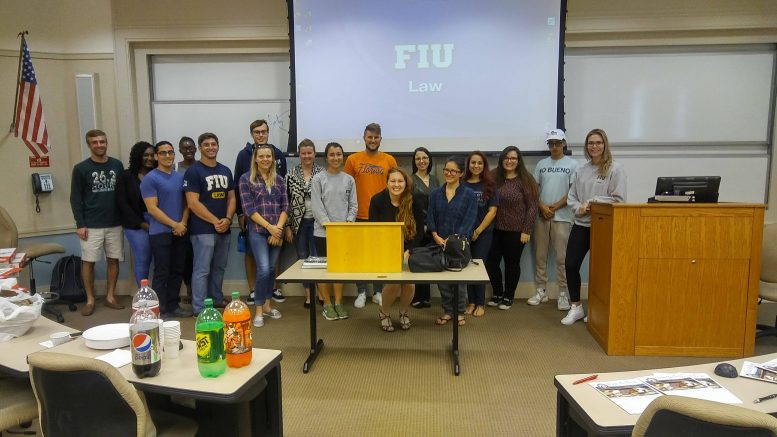By Nelida Insua-Coelho
During the month of October, the Florida International University student law chapter of the animal rights organization, Animal Legal Defense Fund, held their annual “Speak For Farmed Animals Week,” a week dedicated to “raising awareness about the lack of meaningful laws that protect farmed animals from cruel treatment,” as stated on their website.
The FIU chapter of the organization invited the new chair of the law school outreach committee of the Animal Law Section of the Florida Bar, Ashley Baillageron, to speak on behalf of the legal side of activism on Oct. 19, 2017. From laws on both the state and federal courts, Baillageron spoke enthusiastically on the laws that defend and the laws that have yet to be introduced to help animals.
During her speech, she mentioned that people are “more about money than they do about the well-being of animals.” This could not be more true, due to there being a larger audience watching what happens in the animal rights community.
“I don’t know if you know this but factory farms are considered agricultural, not industrial. They have pretty much no regulation at all and they can do whatever they want so it goes unregulated,” said Baillageron during her talk at the FIU College of Law.
Not only are there many grey areas in animal law, but there are also laws that affect the productivity of people wanting to help farmed animals. From the Animal Terrorism Act to AG-GAG laws, industries that exploit animals don’t want their cruel methods exposed to the public since these cause outbursts and drops in sales.
One case that is featured on their website is from the Nonhuman Rights Project. The Coral Springs based animal rights organization’s attorney, Steven Wise argued to the appeal court in March that the caged adult male chimpanzees, Tommy and Kiko, should be granted a Writ of Habeus Corpus, a legal action that means that detainees are able to seek relief from unlawful imprisonment. In the past, Writ of Habeas Corpus has been an instrument for “protecting individual freedom against an arbitrary state action,” as explained by the website, Findlaw.com.
“The Paw Review,” the Florida Bar’s animal law sections journal is available through their website, featuring litigation cases happening throughout the state and the country.
Kiko, a former performing animal, lives in Niagara Falls, New York at a primate sanctuary while Tommy allegedly lives in a cement and steel cage behind trailer sales park in Gloversville, New York. The case seeks to grant the animals protection.
The animal law section began this year, officially part of the Florida Bar. It was approved last year. The Animal Law section takes “an active role in informing Florida Bar members and the public of developments in case law, proposed legislative changes, and other relevant issues in animal law,” according to their website.
They also hold and have held their animal law seminar every year, as well as “conduct research and distribute informational materials regarding animal law.”
The section promotes the study and understanding of laws, regulations and court decisions involving animals. Together with the Animal Legal Defense Fund, a future that offers animals protection is closer to providing resources to battle animal abuse and information for future generations to enter the legal world and stop the abuse.






Be the first to comment on "‘Speak for Farmed Animals Week,’ Florida International University edition"